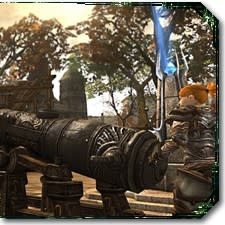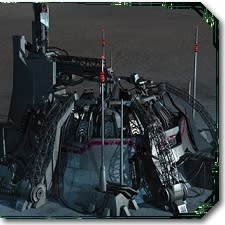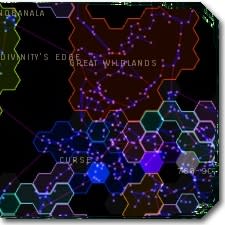EVE Evolved: Designing EVE Onland, part 1
When I'm not playing or writing about EVE Online, I can usually be found huddled over my computer typing lines of code into a compiler and chipping away at bugs that make varying degrees of sense. Designing my own hardcore space game is a really fun challenge and very fulfilling work, but I have a dirty little game dev secret: I've actually always wanted to make a fantasy game. While the budget and personnel required to take on a project the scale of an MMO remain quite far outside my grasp for the moment, it's still fun to think about how I might design such a game if the opportunity arose. The MMO genre seems to be heading for a sandbox revolution this year, and there's no bigger sandbox than EVE Online, but could all of EVE's gameplay translate to a fantasy game?
EVE is probably the most atypical MMO out there, maintaining a subscription-based single-shard PvP sandbox in a genre that's typically headed in the exact opposite direction. There are several new sci-fi sandboxes on the way that may or may not qualify as massively multiplayer titles, but the vast majority of MMO gamers still prefer to keep their feet on the ground in fantasy lands. I often find myself wondering how much of EVE Online's core gameplay is possible only because of its setting -- and how much could actually be applied to a fantasy MMO. Not only should it be possible to adapt most of what makes EVE great to a modern land-based game, but many of the mechanics sandbox gamers now attribute almost solely to EVE actually started life in classic fantasy MMOs like Ultima Online.
In this week's unusual EVE Evolved, I'd like to start a game design thought experiment as I delve into the hypothetical world of EVE Onland.
Free-for-all PvP and consequences
Though most fantasy MMOs are PvE-focused themeparks, the genre has its fair share of games with free-for-all PvP. Titles like Darkfall and Mortal Online proudly wear the feature as a badge of honour, and plenty of games have open PvP servers where chaos largely reigns, but neither is quite the same thing as EVE Online's PvP. While you can technically attack anyone in EVE at any time, there are some pretty heavy consequences for doing so in secure space. Without some serious gameplay-driven and economic consequences to keep players in check, free-for-all PvP just becomes a never-ending chaotic deathmatch rather than an essential sandbox feature.
For EVE Onland, we could have a series of towers deployed around the landscape that would act as police by zapping anyone who illegally attacks another player within designated safe areas. Powerful fast-response towers could be placed in cities, and weaker versions could be placed all throughout the landscape to exact retribution on offenders. The different security levels EVE Online has could be easily emulated by changing the effects and strengths of tower blasts further from cities. Those near a secure city might rain instant death on the heads of vagabonds, while towers further afield might just slow attackers down or have a delayed response. These aren't even new ideas to the fantasy genre; Ultima Online used a similar system with guard zones as far back as 1997, and Dark Age of Camelot similarly uses guards to keep order.
Item destruction and loot
The actual method of retribution is only one part of the consequence trifecta, the other two parts being a game mechanic that punishes repeat offenders and an economic cost that makes the punishment an actual deterrent. Plenty of games have bounty or alignment systems to mark and punish repeat offenders, but few provide any real economic deterrent. Losing a ship in EVE Online is essentially a financial loss, so successfully suicide ganking someone in secure space is a financial investment that pays off only if the victim is foolishly carrying billions of ISK in a tin can of a ship.
Most fantasy games just let you respawn and get straight back to ganking, but it doesn't have to be that way. For EVE Onland, we could easily implement a destructible item system similar to EVE Online's. Items would have to be generic and interchangeable, without the random stat variance that most fantasy games have. RuneScape has the perfect example of such an item system, as every iron longsword or rune dagger has the exact same stats as any other. Better versions of the generic items can still drop as loot, but the number of variations has to be kept quite low. Death itself would also have to be disincentivised by tacking a base cost onto respawning much like EVE Online's clone costs. Item decay as a mechanic has been a hot topic since long before EVE was released, but I think it should be considered a core component of any PvP-oriented sandbox.
Self-direction and PvP motivations
Players clash swords for many reasons in fantasy MMOs, but rarely is it for a motivation of their own making. The same fictional battles replay over and over again, with no empires rising or organisations falling based on the outcome, and no stories or heroes being born on the battlefield. Most MMOs have you sign up to endlessly kill an arbitrary foe for points or gear because you're on the red team and they're on blue, and that's all there is to it. Even those games that do have guild-level warfare fail to match the political machinations of EVE Online's nullsec, where commanders lead fleets of thousands into battle for their alliance's glory, the security of their in-game homelands, and a way of life.
There have been several notable attempts to recreate the magic of EVE on land, but each game feels like its missing a piece of the puzzle. Darkfall locked onto the brutality of free-for-all PvP and full corpse looting, for example, but failed to adequately constrain it into more meaningful sandbox gameplay. Age of Conan had guild halls and even PvP sieges, but every guild got its own private instance with respawning resources and there wasn't much incentive for combat. The game to most closely match EVE's formula in recent memory is Perpetuum, which copied a worryingly large amount of the gameplay wholesale and ultimately failed to grip many players with its mech suit-based gameplay. But the complex territorial warfare seen in EVE actually originated in fantasy lands, with notable examples like Shadowbane and Dark Age of Camelot featuring self-directed PvP and territorial gameplay on land.
What makes territorial warfare work?
The secret sauce behind EVE's territorial conflict is simply to put players in a universe with limited resources and then wait for them to step on each other's toes. There's no reason that can't work in a fantasy MMO, with resources dotted around a large persistent (and non-instanced) overworld map that any guild can claim. Some could be strategic resources like automated ore mines or forests that spit out materials each day, but proximity to certain monsters or other content your guild members might like to tackle also counts as a resource.
EVE players don't just claim systems and moons to make ISK; they do it to carve a little part of the world out for themselves that they enjoy living in. It goes without saying then that a territorial system like this would have to employ a form of player-built housing, as there's no point in claiming some territory if you have to live on the other side of the map. Guilds could build their own cities from the ground up, complete with item storage, housing, and defensive towers to debuff nearby enemies or zap anyone that attacks the guild's members unprovoked. If that sounds like a tall order for an MMO to implement, just remember that older fantasy MMOs have been doing similar things since EVE was just an gleam in an insane Icelandic developer's eye.
EVE Online might be unique among MMOs, but the elements that make it a successful sandbox MMO aren't necessarily exclusive to the depths of space. The single-shard server model is obviously a lot more feasible when everyone flies point-like physics objects rather than hammering on twitch controls, but many other features could easily translate to the fantasy genre or were actually adapted from it in the first place.
The hardcore PvP sandboxes of the early 2000's can look dated by modern standards and never managed to grow quite as large as EVE Online, but some of them are still running after all these years. With the impending rise of sandbox MMOs led by new games like EverQuest Next and Camelot Unchained, there's now hope for a successful return of the classic PvP style of Ultima Online and Dark Age of Camelot to the fantasy genre in a modern format that today's gamers can more easily connect with. If that doesn't have you excited as a sandbox gamer, I don't know what will!
Join me next week, when I'll be adding transport and exploration gameplay to the imaginary world of EVE Onland and explaining why I think procedural generation is the future of sandbox gameplay.

Brendan "Nyphur" Drain is an early veteran of EVE Online and writer of the weekly EVE Evolved column here at Massively. The column covers anything and everything relating to EVE Online, from in-depth guides to speculative opinion pieces. If you have an idea for a column or guide, or you just want to message him, send an email to brendan@massively.com.







